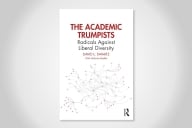You have /5 articles left.
Sign up for a free account or log in.
In discussions of education policy, and especially of educational failings, it's common to hear references to "what the business community thinks" or "what employers want."
It turns out that employers aren't as frustrated with the skills of new graduates as some politicians and policy makers suggest. In a number of areas, employers appear to think graduates are coming out well positioned. And while employers would love to see better assessment tools used in college (as you may have heard from some critics of higher education), employers seem dubious of multiple choice exams and how colleges compare to one another and much more concerned with being able to get individual analyses of potential employees' skills.
Those conclusions come from a national survey of employers with at least 25 employees and significant hiring of recent college graduates, released Tuesday by the Association of American Colleges and Universities. Over all, 65 percent of those surveyed believe that new graduates of four-year colleges have most or all of the skills to succeed in entry-level positions, but only 40 percent believe that they have the skills to advance.
In terms of specific skills, the employers didn't give many A's or fail many either. The employers were asked to rank new graduates on 12 key areas, and the grads did best in teamwork, ethical judgments and intercultural work, and worst in global knowledge, self-direction and writing.
Employers Ratings of College Graduates Preparedness on 1-10 Scale
| Category | Mean Rating | % giving high (8-10) rating | % giving low (1-5) rating |
| Teamwork | 7.0 | 39% | 17% |
| Ethical judgment | 6.9 | 38% | 19% |
| Intercultural skills | 6.9 | 38% | 19% |
| Social responsibility | 6.7 | 35% | 21% |
| Quantitative reasoning | 6.7 | 32% | 23% |
| Oral communication | 6.6 | 30% | 23% |
| Self-knowledge | 6.5 | 28% | 26% |
| Adaptability | 6.3 | 24% | 30% |
| Critical thinking | 6.3 | 22% | 31% |
| Writing | 6.1 | 26% | 37% |
| Self-direction | 5.9 | 23% | 42% |
| Global knowledge | 5.7 | 18% | 46% |
To the extent that employers give graduates mixed grades, that raises the question of how they determine who is really prepared. Many of the existing tools appear to be insufficient, the poll found.
Only 13 percent said transcripts were very useful with another 16 percent saying fairly useful, compared to 33 percent who said "not useful."
What the employers appear to want are intensive, personally evaluated projects, not more testing. Only 7 percent said it would be "very effective" to have the results of multiple choice tests of general knowledge, and there was little interest in tools that would compare on colleges' graduates to another on critical thinking tests.
In contrast, 46 percent said it would be very effective and 70 percent said it would be very or fairly effective to have students complete an advanced project as seniors, demonstrating knowledge in the major and in problem-solving, writing, and analytic skills. And 69 percent said it would be very effective and 83 percent said it would be very or fairly effective to see an evaluation of a supervised internship where students apply college learning in a "real-world setting."
The results appear to contradict statements from Education Secretary Margaret Spellings and many politicians that the business community is demanding tools that allow for comparisons of colleges on how they perform in certain areas.
Carol Geary Schneider, president of the AAC&U, said in a press briefing on the data that "there was truth and misunderstanding" in discussions over the last year of what business leaders want. "They do want more transparent forms of assessment," she said, "but there was an assumption that people want more of the kinds of assessments of the sort that the testing industry provides."
In fact, what business leaders appear to want is much more individual and less focused on comparing colleges, according to the new poll. Focusing on new multiple choice measures to assess, she said, "is not a good investment."








